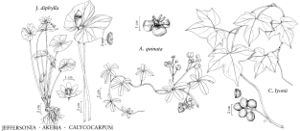Lardizabalaceae
Vines [small trees or shrubs], woody, evergreen or deciduous. Stems without spines. Leaves alternate; stipules absent [except in Lardizabala]; petioles present. Leaf-blade palmately compound [pinnately compound or 1-3-ternate]. Inflorescences axillary, racemes, occasionally solitary flowers, flowers pedicellate. Flowers unisexual, staminate and pistillate on same plants in same or different inflorescences [staminate and pistillate on different plants or flowers bisexual, staminate, and pistillate], showy, 3-merous; sepaloid bracteoles absent; sepals 3-6, distinct, usually petaloid, not spurred; petals absent [6; nectary present]. Staminate flowers: stamens 6 (-8), distinct [proximally connate]; anthers with 2 pollen-sacs, extrorse, dehiscing longitudinally; pistillodes sometimes present. Pistillate flowers: staminodes sometimes present; pistils 3-15 in 1-5 whorls of 3 each, 1-carpellate, 1-locular; placentation submarginal or laminar; ovules 100-several hundred [1-20]; stigma 1, sessile to nearly sessile. Fruits aggregates of berries or of fleshy follicles (sometimes only 1 pistil maturing). Seeds [1-] 100-several hundred, never stalked; aril absent; endosperm abundant; embryo small, straight.
Distribution
North America, South America, Asia
Discussion
Genera ca. 8, species ca. 30 (1 genus, 1 species in the flora).
Lardizabalaceae have a disjunct distribution. Two of the genera–Decaisnea and Lardizabala–are found in Chile; the others are Asiatic (Himalayas to Vietnam, Japan, and Korea).
Selected References
None.
